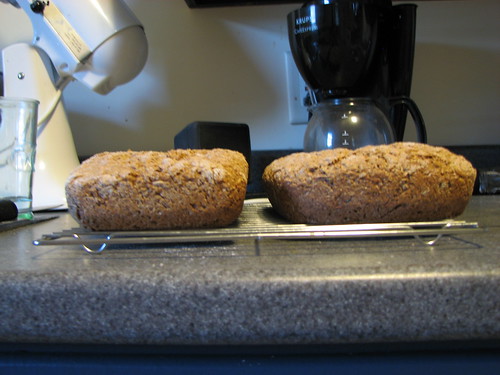There are few things I love so much as a frittata. Easy as scrambled eggs and taking only a few minutes longer, a frittata can absorb whatever you've got in the fridge or garden that needs using: zucchini, of course, half and onion and half a leek, some funny-shaped carrots, a quarter of a red pepper and a purple one, mushrooms, potatoes, tomatoes, an orphaned ear of corn. Cheddar and mozzarella, both. Maybe some chevre if you've got it. Or it's equally delicious with only potatoes and onions, or olives and tomatoes, or green beans and swiss.
The frittata's great benefit over its
equally-adaptable cousin the omelet is that it keeps nicely. It's delicious hot, room-temp or chilled, and does service for breakfast, brunch, or lunch. With a few slices of garden tomatoes, a bit of good bread, and a nice white wine, it even makes a lovely summer dinner. Plus it is eminently healthy: veggies, eggs, just a touch of oil (or butter or bacon grease, depending). I refuse, by the way, to accept that eggs or oil (or butter or even bacon grease) are bad for me. Even in a moderation that tends towards indulgence.
So enamored am I, that I will share with you J's great frittata secret (and may he forgive me):
When you are first cooking the vegetables, especially the potatoes, douse them in a half-cup or so of broth, stock, or bullion, and let it cook off before you add the eggs. You will assure yourself of fully-cooked potatoes (or carrots, broccoli, etc) and they will be intensely delicious and moist. My only tip is to add the herbs (if fresh) just before the eggs, giving everything one last quick stir as you pour them in. Also to always add some last bit of cheese (if you've got cheese) on top just before setting it in the broiler (and also to always use the broiler to finish a frittata - it gives it such a nice crispy finish and there's no risk of getting it on the floor). My mother always laid a few slices of tomato around the top right towards the end as well, which is nice if you've got company. I always forget that part.
If you wanted a recipe, it might go like this:
Veggies
Herbs
Eggs
Chop your veggies (mine were a zucchini, two carrots, half a leek, and one monster potato). Smaller pieces mean faster cooking - I like mine in thin slices more than chopped. Heat a deep cast-iron skillet with lipid of your choice, then add potatoes. Let them cook a bit, then add the onions. Let them cook a bit. Douse them with some broth and throw on the rest of the veggies and mix it all up.
Chop the herbs, but hold on to them for a minute. If you've just remembered you had some corn in the frige, get that out real quick. It didn't want to cook very long anyway.
Beat the eggs (I had seven), and hold on to them, too. If you've got cheese, mix some in now. If you have milk, you can beat some of that in, too, especially if you're short on eggs.
Taste a potato. If it's delicious, and most of the broth is gone, you're ready to move on.
Throw on the herbs and the corn, and stir it all up. Grind some salt and pepper into the eggs, and pour them on. Squash down the veggies with the back of your spatula so they're all under the egg.
Let it cook until the edges get cooked-looking and you can easily get to some cooked part in the middle. If you only just remembered you had cheese, throw it on now.
When the top is just beginning to look dry (or melty, depending), throw it in the broiler, and broil until there's a nice crispy top. But don't go check your email, because nice and crispy turns to totally burned really quickly.
If you let it cool a minute, it'll hold together better. If you don't, it'll be delicious anyway.
Really, really delicious.
(And, for those who care: 100% local! Potatoes and herbs from my garden, as well as the side of tomatoes. Local bread and J's homebrew. Yum.)
[Updated to add: When did this become a food blog?!]

